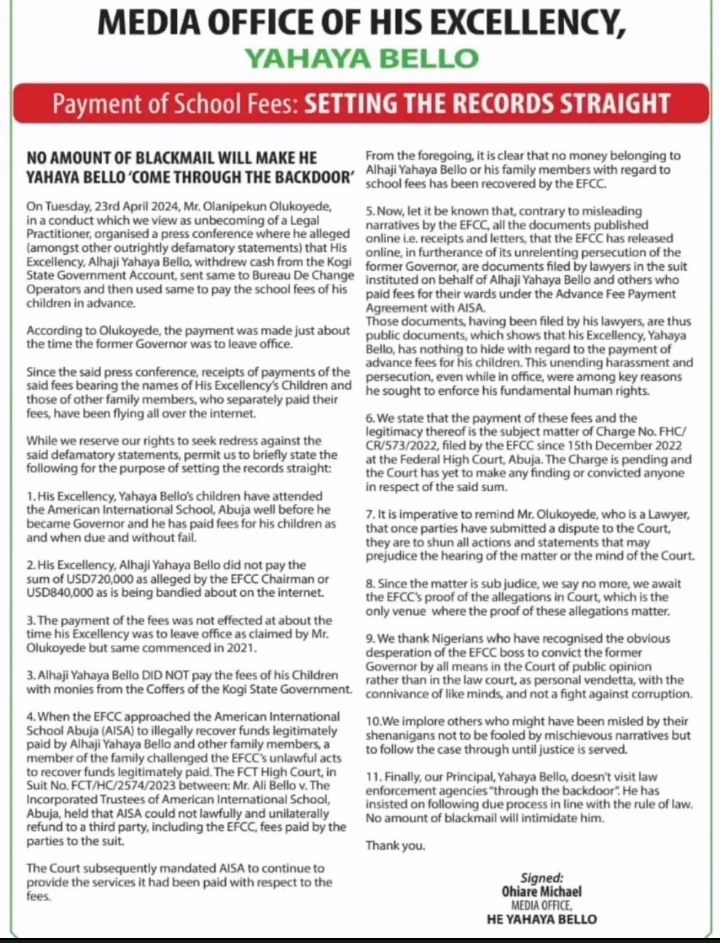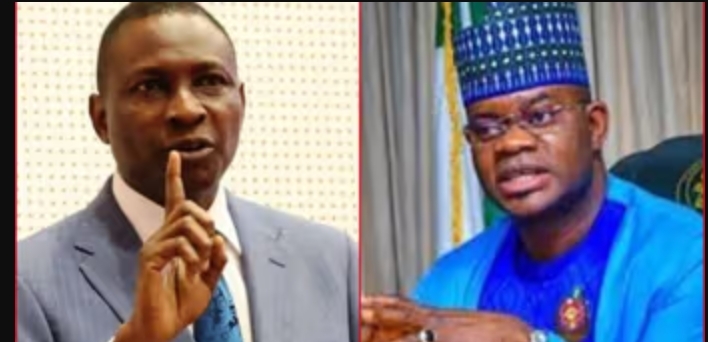In the article “Fighting Corruption in a Multicultural Society,” I referenced Yahaya Bello’s concerted efforts at mudslinging the Economic and Financial Crimes Commission (EFCC) for its dogged determination to hold him to account for his alleged fiscal mismanagement and embezzlement of Kogi State Treasury when he was governor of the state. Of course, all the allegations on his charge sheet are mere allegations until proven in court. However, the recent supposed rebuttal by the former governor through his media aide, Mr. Ehiare Michael, against EFCC chair Ola Olukoyede for his press briefing, where he accused the governor of “withdrawing a huge amount of money to pay his children’s tuition”, is not only self-indicting but insufferably insulting. From where did Yahaya Bello ‘legitimately’ source the funds he deposited into his children’s school bank account? Does Mr. Michael grasp the broader meaning of the word ‘legitimate’? Can his principal factually prove before a trial court how he acquired the money? Given Mr. Bello’s purported wealth, enabling him to afford his children’s education at AISA even before assuming governorship, why did he not arrange advance tuition payments prior to 2021?
On October 24, 2022, following a request by the EFCC, the American International School of Abuja (AISA) confirmed in a letter to the agency that the governor had entered into an agreement with the school to pay for the tuition and other fees of his children “until they graduate from the school.” Since October 7, 2021, a total of $845,852.84 has been paid into AISA’s bank account. After deducting their service charge for schooling his four children, the school agreed to refund $760,910.84 to the Nigerian government through the EFCC. In their correspondence with the EFCC, AISA stated that “no further fee is expected until they graduate” from the school.
To the arithmetic of the developing situation, a total amount of $84,942 has been clearly deducted from the advance deposit made by Mr. Bello. Now, what was the total monthly salary of Yahaya Bello when he was the executive governor of Kogi State?
According to The Punch report, sourced from the Revenue Mobilisation and Fiscal Commission, the total monthly take-home salary for a governor is “₦648, 580.62”, inclusive of hardship and ‘consistency’ allowances. Since he was governor for 8 years, approximately, his total salary should amount to ₦62,263,739.52 And his annual salary would be ₦7,782,967.44. Considering that he started making the advance payment the first week in October 2021; logically, from the time he received his first salary, presumably in January 2016, to September 2021, he would have received a total salary of ₦44,752,062.78. In 2019, he purchased the APC governorship form for ₦25,000,000. When this amount is deducted from the ₦44,752,062.78, his salary will remain a balance of ₦19,752,062.78 for the period in review. The foregoing computation assumes that the total personal expenditure Mr. Bello incurred during this period is only the governorship form he purchased. (This calculation is speculative and may not reflect actual circumstances.)
In 2021, on the open market, the dollar was exchanged for the naira at an average rate of ₦481.21. If the balance of his salary (after deducting the cost of the aforementioned form) is converted to US dollars, he should have roughly $41,046.66. Converted back to naira, using the metric above, Governor Bello, through his nephew Ali Bello, paid an equivalence of ₦407,032,845.13 to AISA as an advanced tuition deposit for his children. Again, recall that his total salary throughout his governorship career was approximately ₦62,263,739.52, at ₦7,782,967.44 per annum. But he was able to deposit more than ₦407,000,000, probably within a year, for his children’s tuition, which is by far in excess of what they would need throughout their combined stay at the school. Money laundering? That’s for the court to decide.
Who is Yahaya Bello?
He was born on June 18, 1975. He obtained his first degree in accounting and business administration from ABU, Zaria, in 1999. Furthermore, he joined the Revenue Mobilization and Fiscal Commission (RMAFC) in 2001 and “voluntarily” resigned in 2009 as an assistant chief accountant. Between 2009 and 2015, the year he was accidentally elected Kogi State governor, he reportedly “invested in the stock trading business, and luck smiled at him with a financial breakthrough shortly before the crash in the stock market business,” according to his bio on the state’s official website. Apparently, he made so much money trading in “stock” that he invested the proceeds in “oil [and] gas, banking, transportation, agro-related business, and real estate development.” The ingenuity he supposedly applied, which allegedly led to his significant gains in the stock market before its subsequent crash, warrants further examination. Frankly, these politicians hold little regard for the public’s intelligence. Imagine the gauzy crap that is his career biography and the bogus claim by his overzealous aide. Hopefully, he will use the “front door” to surrender himself to the EFCC for arraignment.





Leave a comment